BMW i4 VS Peugeot 408 – Specs, Efficiency & Price Comparison
Which model is the better choice – the BMW i4 or the Peugeot 408? We compare performance (544 HP vs 225 HP), boot capacity (470 L vs 536 L), efficiency (13 kWh vs 15.10 kWh1.40 L), and of course, the price (49300 £ vs 34300 £).
Find out now which car fits your needs better!
The BMW i4 (Hatchback) is powered by a Electric engine and comes with a Automatic transmission. In comparison, the Peugeot 408 (SUV) features a Plugin Hybrid, Electric or Petrol MHEV engine and a Automatic gearbox.
When it comes to boot capacity, the BMW i4 offers 470 L, while the Peugeot 408 provides 536 L – depending on what matters most to you. If you’re looking for more power, you’ll need to decide whether the 544 HP of the BMW i4 or the 225 HP of the Peugeot 408 suits your needs better.
There are also differences in efficiency: 13 kWh vs 15.10 kWh1.40 L. In terms of price, the BMW i4 starts at 49300 £, while the Peugeot 408 is available from 34300 £.
Compare all the key specs now and find out which model fits your lifestyle best!
BMW i4
The BMW i4 beautifully merges the dynamism of a saloon with the efficiency of an electric vehicle, offering a truly exhilarating driving experience. Its design seamlessly blends elegance and athleticism, highlighting BMW's dedication to both aesthetics and performance. Inside, the i4 boasts a high-tech cockpit that harmonises luxury with intuitive technology, allowing drivers to stay connected while on the move.
details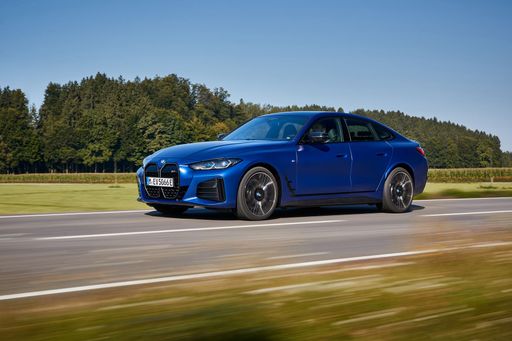 @ press.bmwgroup.com
@ press.bmwgroup.com
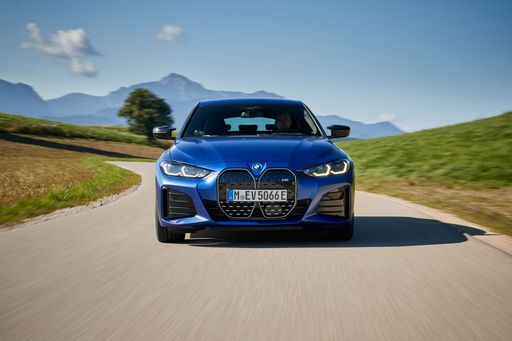 @ press.bmwgroup.com
@ press.bmwgroup.com
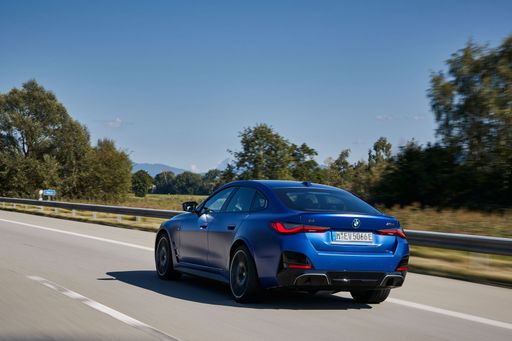 @ press.bmwgroup.com
@ press.bmwgroup.com
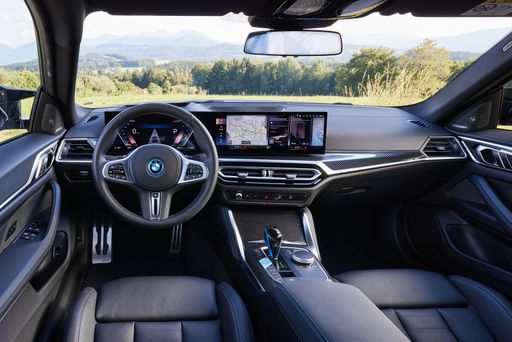 @ press.bmwgroup.com
@ press.bmwgroup.com
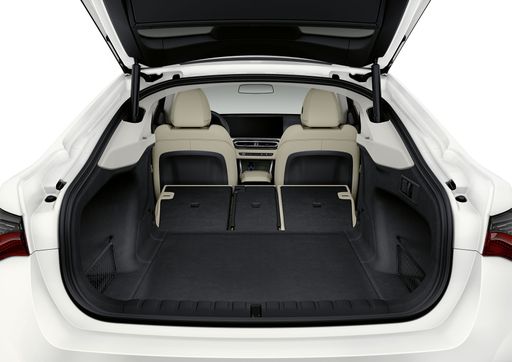 @ press.bmwgroup.com
@ press.bmwgroup.com
Peugeot 408
The Peugeot 408 captivates with its sleek and dynamic design, setting it apart in the competitive crossover market. Its interior offers a perfect blend of comfort and cutting-edge technology, creating an enjoyable driving experience. The model's efficient performance and modern features make it a compelling choice for those seeking both style and functionality in their vehicles.
details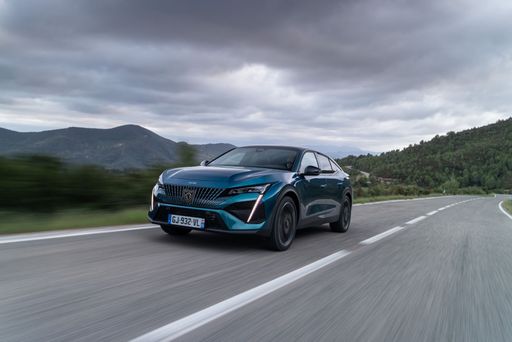 @ media.stellantis.com
@ media.stellantis.com
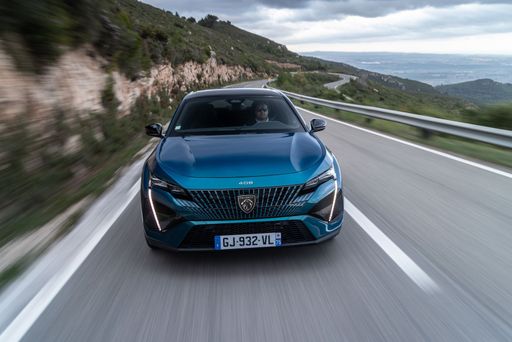 @ media.stellantis.com
@ media.stellantis.com
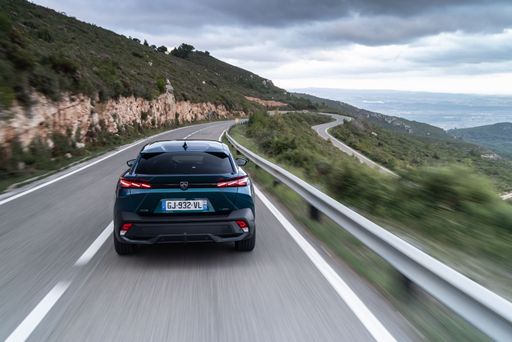 @ media.stellantis.com
@ media.stellantis.com
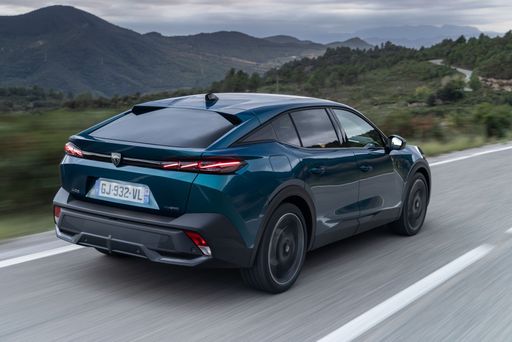 @ media.stellantis.com
@ media.stellantis.com
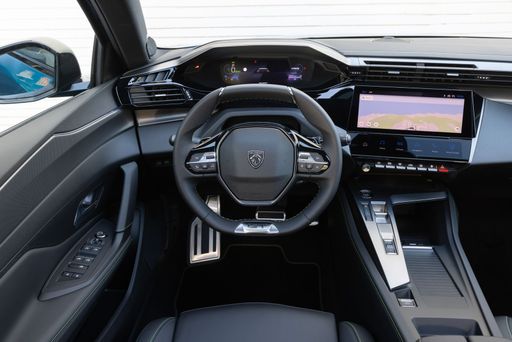 @ media.stellantis.com
@ media.stellantis.com

|

|
|
|
|
Costs and Consumption |
|
|---|---|
|
Price
49300 - 61800 £
|
Price
34300 - 44400 £
|
|
Consumption L/100km
-
|
Consumption L/100km
1.4 - 5.1 L
|
|
Consumption kWh/100km
13 - 15.8 kWh
|
Consumption kWh/100km
15.10 kWh
|
|
Electric Range
500 - 600 km
|
Electric Range
63 - 453 km
|
|
Battery Capacity
67.1 - 81.3 kWh
|
Battery Capacity
11.3 - 58.2 kWh
|
|
co2
0 g/km
|
co2
0 - 114 g/km
|
|
Fuel tank capacity
-
|
Fuel tank capacity
40 - 52 L
|
Dimensions and Body |
|
|---|---|
|
Body Type
Hatchback
|
Body Type
SUV
|
|
Seats
5
|
Seats
5
|
|
Doors
5
|
Doors
5
|
|
Curb weight
2075 - 2290 kg
|
Curb weight
1544 - 1879 kg
|
|
Trunk capacity
470 L
|
Trunk capacity
471 - 536 L
|
|
Length
4783 mm
|
Length
4687 mm
|
|
Width
1852 mm
|
Width
1848 mm
|
|
Height
1448 mm
|
Height
1478 mm
|
|
Payload
445 - 480 kg
|
Payload
371 - 456 kg
|
Engine and Performance |
|
|---|---|
|
Engine Type
Electric
|
Engine Type
Plugin Hybrid, Electric, Petrol MHEV
|
|
Transmission
Automatic
|
Transmission
Automatic
|
|
Transmission Detail
-
|
Transmission Detail
Automatikgetriebe, Automat. Schaltgetriebe (Doppelkupplung)
|
|
Drive Type
Rear-Wheel Drive, All-Wheel Drive
|
Drive Type
Front-Wheel Drive
|
|
Power HP
286 - 544 HP
|
Power HP
145 - 225 HP
|
|
Acceleration 0-100km/h
3.9 - 6 s
|
Acceleration 0-100km/h
7.2 - 9.4 s
|
|
Max Speed
190 - 225 km/h
|
Max Speed
160 - 233 km/h
|
|
Torque
400 - 795 Nm
|
Torque
230 - 360 Nm
|
|
Number of Cylinders
-
|
Number of Cylinders
4
|
|
Power kW
210 - 400 kW
|
Power kW
107 - 165 kW
|
|
Engine capacity
-
|
Engine capacity
1199 - 1598 cm3
|
General |
|
|---|---|
|
Model Year
2024
|
Model Year
2024 - 2025
|
|
CO2 Efficiency Class
A
|
CO2 Efficiency Class
B, A, C
|
|
Brand
BMW
|
Brand
Peugeot
|
BMW i4
Exploring the Future: The BMW i4
In the ever-evolving landscape of electric vehicles, BMW has stepped forward with its state-of-the-art BMW i4. This model combines luxury, performance, and sustainability, reflecting the brand's commitment to innovation and excellence. Let's dive into the technical details and the innovative features that make the BMW i4 a noteworthy entry in the electric vehicle market.
Power and Performance Unleashed
Under the sleek bonnet of the BMW i4 lies a powerful electric motor, offering a range of performance options from 286 to an exhilarating 544 PS. With a 0 to 100 km/h acceleration time spanning between 3.9 and 6 seconds, the i4 provides a driving experience that matches its sporty exterior. The advanced powertrains offered include rear-wheel drive as well as all-wheel drive options, catering to different driving preferences.
Energy Efficiency Meets Long Range
The BMW i4 stands out not only for its performance but also for its impressive efficiency and range. The electric vehicle boasts a consumption rate ranging from 15.6 to 18 kWh per 100 km, complemented by an electrical range between 485 and 582 km. Such figures are achieved through BMW's innovative engineering and the generous 67.1 to 81.3 kWh battery capacity.
Innovation and Technology at the Core
BMW has infused advanced technology throughout the i4 to enhance both comfort and connectivity. The vehicle features state-of-the-art integration with the BMW iDrive system, providing seamless control and access to driving data, entertainment, and navigation. Furthermore, the i4 is fitted with cutting-edge driver assistance features, making every journey safer and more enjoyable.
Design and Functionality: The Perfect Balance
The aesthetically pleasing design of the BMW i4 is equally matched by its functional interior. With a 470-litre boot and the ability to comfortably seat up to five passengers, the vehicle balances practicality with style. The streamlined body measuring 4783 mm in length, 1852 mm in width, and 1448 mm in height, ensures that head-turning aesthetics are accompanied by aerodynamic efficiency.
Sustainability in Motion
Beyond performance and elegance, the BMW i4 is a testament to the brand's commitment to sustainability. As a zero-emission vehicle with a CO2 output of 0 g/km, it aligns with the global shift towards environmentally friendly transportation solutions. Furthermore, its efficient energy consumption underscores its effectiveness as a leader in electric vehicle innovation.
Conclusion: The BMW i4 – A Visionary Road Ahead
The BMW i4 is more than just an electric car; it is a sophisticated blend of cutting-edge technology, impressive range, and unparalleled performance. With its CO2 efficiency class rating of A and top-tier driving dynamics, the i4 is set to redefine the standards for electric vehicles in the luxury segment. Whether for a daily commute or a longer journey, the BMW i4 promises an exceptional driving experience while paving the way for a sustainable future.
Peugeot 408
The New Lion on the Block: The Peugeot 408
As Peugeot continues to innovate within the SUV segment, the latest iteration of the Peugeot 408 sets new standards in technology, efficiency, and design. With its cutting-edge engineering and innovative features, the Peugeot 408 is more than just a stylish SUV—it's a marvel of modern automotive technology. This article dives into the technical details and innovations that make the Peugeot 408 a highly compelling choice for consumers in the market for a new vehicle.
A Glimpse into the Engine Bay: Performance and Efficiency
The Peugeot 408 comes with a diverse range of powertrains that blend performance and fuel efficiency. Featuring a selection of petrol mild-hybrid, petrol, and plug-in hybrid options, the 408 caters to a variety of driving preferences. The engines have a power output ranging from 131 to 225 PS, ensuring that there's a version suited to both city commutes and highway cruising.
Fuel economy is a significant focus, with consumption figures spanning from an impressive 1.5 L/100km for the plug-in hybrid models to a moderate 6.1 L/100km for the traditional petrol engines. Additionally, the plug-in hybrid versions boast an electric range of up to 55 kilometres, ideal for reducing emissions during shorter journeys.
Ultimate Comfort and Technology in the Cockpit
Peugeot excels in creating interiors that provide both comfort and cutting-edge technology. The 408 doesn't disappoint in this regard. It offers a spacious cabin, accommodating up to five passengers, with high-quality materials and ergonomic designs that enhance the driving experience.
The infotainment system in the Peugeot 408 is state-of-the-art, featuring a responsive touchscreen interface, premium sound options, and seamless connectivity with smartphones. Advanced driver-assistance systems such as adaptive cruise control, lane-keeping assist, and automated emergency braking ensure that journeys are not only comfortable but also safe.
Design Meets Function: Exterior and Practicality
In the realm of exterior design, Peugeot has delivered a striking silhouette with aerodynamic lines and a robust SUV stance. Measuring 4687 mm in length, 1848 mm in width, and 1478 mm in height, the 408 boasts a dynamic presence on the road without compromising on practicality.
Practicality is further enhanced by a generous boot space that ranges from 471 to 536 litres, depending on the model, making it perfect for family trips or weekend getaways. A high payload capacity and thoughtfully designed storage solutions ensure that the Peugeot 408 remains versatile, able to adapt to various lifestyle needs.
Environmental Responsibility and Sustainable Driving
With a keen eye on sustainability, the Peugeot 408 offers an impressive CO2 efficiency rating. The plug-in hybrid versions, in particular, present a substantial reduction in carbon emissions, operating at as low as 33 g/km. This makes the 408 a viable option for environmentally conscious consumers seeking to minimise their carbon footprint.
The automaker's commitment to sustainability does not end at emissions. The materials used in the 408's construction are carefully selected to promote durability and recyclability, ensuring that the vehicle maintains a lower impact on the environment throughout its lifecycle.
Conclusion: The Perfect Blend of Innovation and Tradition
The Peugeot 408 is a remarkable illustration of Peugeot's ability to blend traditional automotive values with the latest technological advancements. Its innovative powertrains, luxurious interiors, and forward-thinking design make it a formidable contender in the competitive SUV market. Whether you prioritise fuel economy, driving performance, or cutting-edge technology, the Peugeot 408 is poised to meet and exceed expectations. As Peugeot advances into the future, the 408 leads the charge as a testament to the brand's relentless pursuit of excellence.
The prices and data displayed are estimates based on German list prices and may vary by country. This information is not legally binding.
